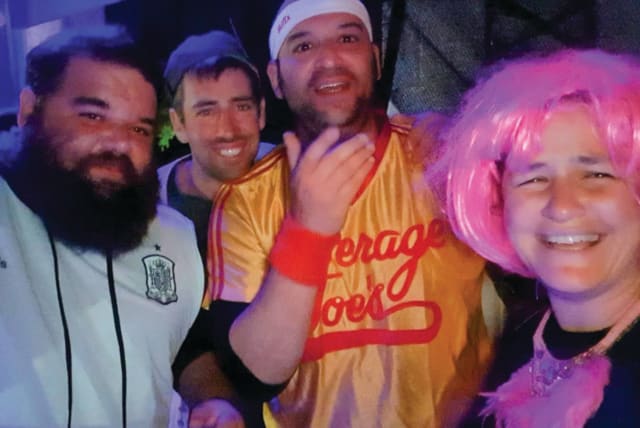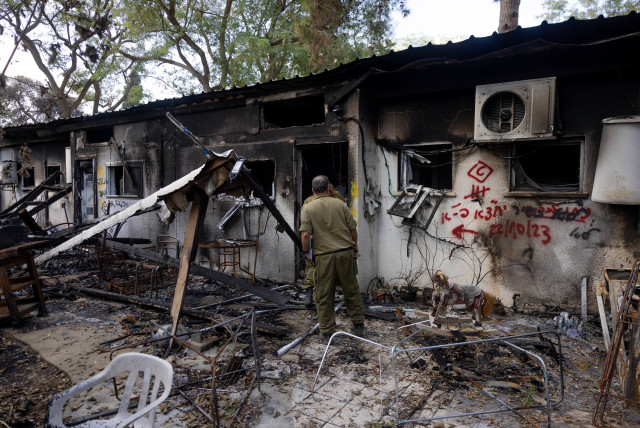Grassroots efforts connect Latino community amid Israel-Hamas war - opinion

Leading the mission is a Latino youth educator from Argentina who lives in Israel and tirelessly works to free his two brothers held hostage by Hamas.
A strategic collaboration between ISRAEL-is and the American Jewish Committee (AJC) embarks on a poignant mission, extending support to families of hostages of Spanish-speaking origin, while reaching out for the first time to Latino leadership and influencers in Houston, Texas.
Houston, home to one of the largest and most influential Latino communities in the United States, with over 2.3 million individuals comprising 40% of the city’s population, stands as a testament to the cultural, economic, and social prowess of these communities. These leaders serve as pillars of progress for Houston and as beacons of inspiration for Latino communities nationwide.
At the forefront of this mission is Amos Horn (42), a Latino youth educator and tour guide originally from Argentina, who lives in Israel. His efforts to free his two kidnapped brothers, Yaniv (45) and Eitan (37), kidnapped on October 7 from Kibbutz Nir Oz, added a deeply intimate layer to the cause. This double tragedy struck deep, resonating with countless families still grappling with the anguish of hostage situations, sometimes with more than one family member held captive. My personal connection to the cause, through Amos’s father and former colleague of mine, Itzik Horn, at the Sderot Media Center that I led over a decade ago, whose health situation is deteriorating, added an intimate layer to the mission’s purpose.
The fate of the Horn brothers remained shrouded in uncertainty, with sporadic glimpses of life emerging months after their disappearance. Hostage witnesses released towards the end of November spoke of their staggering weight loss (20 kg.), casting a grim shadow over their well-being. Since then, there has been no sign of life. Amos bravely shared his family’s ordeal at various forums, from diplomatic gatherings to meetings with Houston’s legislative and Latino influencers.
He painted a vivid picture of his brothers’ zest for life, reminiscing about their shared love for soccer matches, music concerts, and full-time uncle duties to Amos’s young children, highlighting the infectious joy both brothers brought to Kibbutz Nir Oz.
Connections with Jewish Latino youth
Despite the primary focus of our mission on engaging policymakers, media outlets, and influential figures within the Latino community, we made a deliberate effort to connect with Jewish teen leaders as well. It was during one of these interactions that Amos shared a touching anecdote about the upcoming Purim holiday. He recounted how his brothers had taken on the responsibility of organizing the Purim spiel – a traditional performance aimed at uplifting the spirits of their community at Kibbutz Nir Oz.
To illustrate this cherished memory, Amos passed around a photograph of his brothers dressed up for the Purim festivities, alongside the Kedem-Siman Tov couple, murdered in the October 7 massacre along with their three young children aged two to five years old.
Reflecting on my experience upon arriving in Houston, a stark reality greeted me as I tuned into the news channels from my hotel room. A vociferous Gaza ceasefire demonstration unfolded during the Houston mayor’s annual tradition of addressing the Muslim community during the iftar of Ramadan, marking the 25th year tradition. The protest, marked by its aggressive interruption of the mayor’s speech, highlighted discontent over the mayor’s stance on refusing to advocate for a ceasefire in Gaza.
Despite the disruptive behavior of some demonstrators, it’s noteworthy that over 2,000 attendees chose not to participate in the protest, underscoring the resilience of the broader community and the significance of the occasion.
The Israeli consul general in Houston, Livia Link-Raviv, emphasized in a recent meeting with diplomats from foreign countries the ongoing challenges facing the consulate, including regular demonstrations outside its offices that disrupt normal operations. These protests have even led to the cancellation of planned events, such as those in New Mexico and during our mission in Houston, where pressure from extreme groups against participation in specific gatherings led to annulments of events, notably an evening with young Republicans.
This mission arose at the same time as increased international pressure, especially emphasized in the statement of US Secretary of State Blinken claiming that 100% of the population in Gaza is at severe levels of acute food insecurity. This is known for a fact to be disinformation, whose sole purpose is to blame Israel for Gazans’ conditions instead of the aid distribution challenges in Gaza, which is controlled by Hamas’s terrorist regime.
According to COGAT, Israel’s Coordinator of Government Activities in the Territories, since the beginning of the war, Israel has allowed the entry of more than 17,400 aid trucks into the Gaza Strip, which include more than 10,300 trucks containing more than 218 thousand tons of food.
For context, the average daily number of trucks carrying food to the Gaza Strip before the war was around 70, and the average since the beginning of March is over 125 – an 80% increase.
Narratives of antisemitism and blood libels
This new blood libel in practice allows for the prolongation of the fighting and the obfuscation of the war crime of holding 134 hostages under inhumane conditions.
The German consul at the meeting of diplomats, after hearing first-hand Amos’s story, emphasized the urgent need to balance the narrative by making the voices and stories of the families of the hostages heard, putting the survivors and witnesses of the events of October 7 at the forefront, to be heard by the general public.
It was emphasized that such narratives often lack the attention needed to provide a balanced perspective – while acknowledging the importance of Holocaust education, where survivors and eyewitnesses play a central role in shaping the narrative and fostering significant change.
Nevertheless, buoyed by the unwavering support of Latino leadership, the mission persists.
Amos’s narrative strikes a chord, prompting advocacy efforts to amplify the voices of hostage families on a national stage.
As Texas’ Hispanic/Latino population continues to burgeon, the significance of such collaborations grows exponentially, promising a future where diverse voices shape the narrative of unity and resilience.
The writer is foreign affairs manager of ISRAEL-is, an NGO.
Jerusalem Post Store
`; document.getElementById("linkPremium").innerHTML = cont; var divWithLink = document.getElementById("premium-link"); if (divWithLink !== null && divWithLink !== 'undefined') { divWithLink.style.border = "solid 1px #cb0f3e"; divWithLink.style.textAlign = "center"; divWithLink.style.marginBottom = "15px"; divWithLink.style.marginTop = "15px"; divWithLink.style.width = "100%"; divWithLink.style.backgroundColor = "#122952"; divWithLink.style.color = "#ffffff"; divWithLink.style.lineHeight = "1.5"; } } (function (v, i) { });

